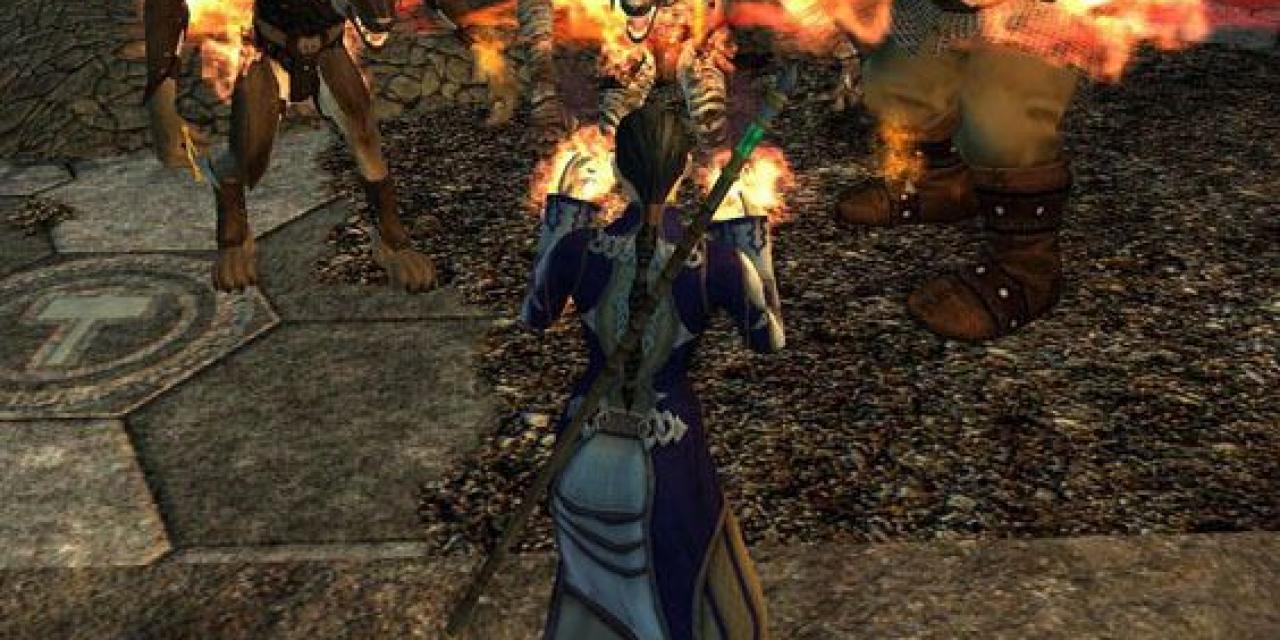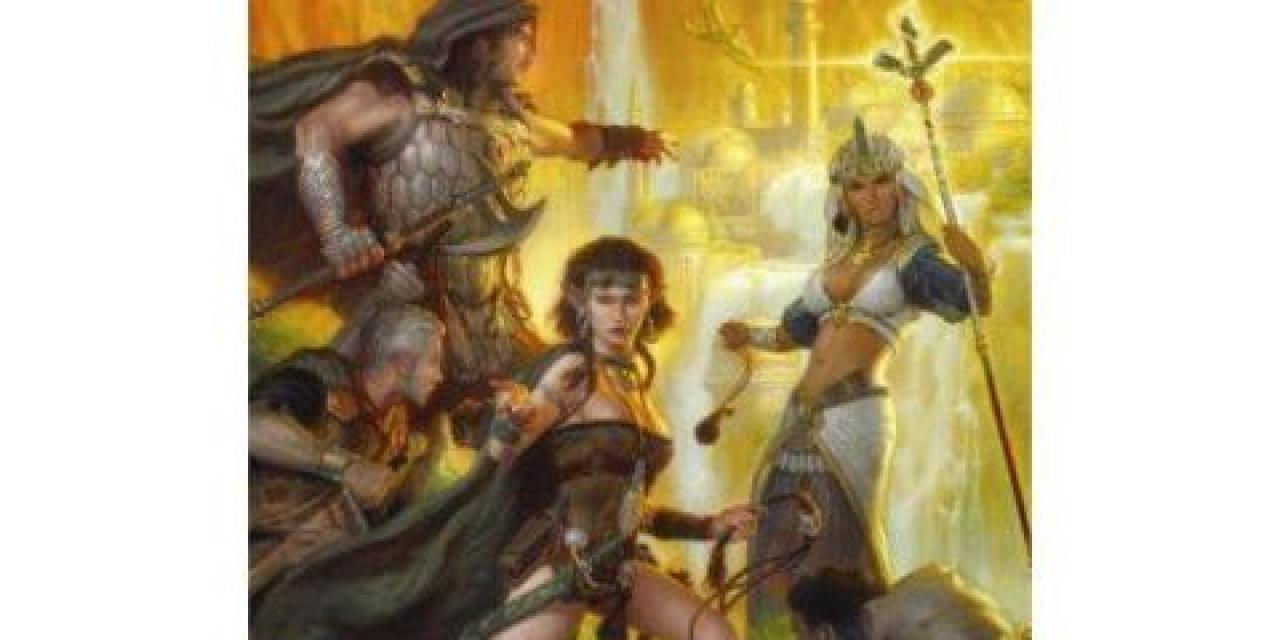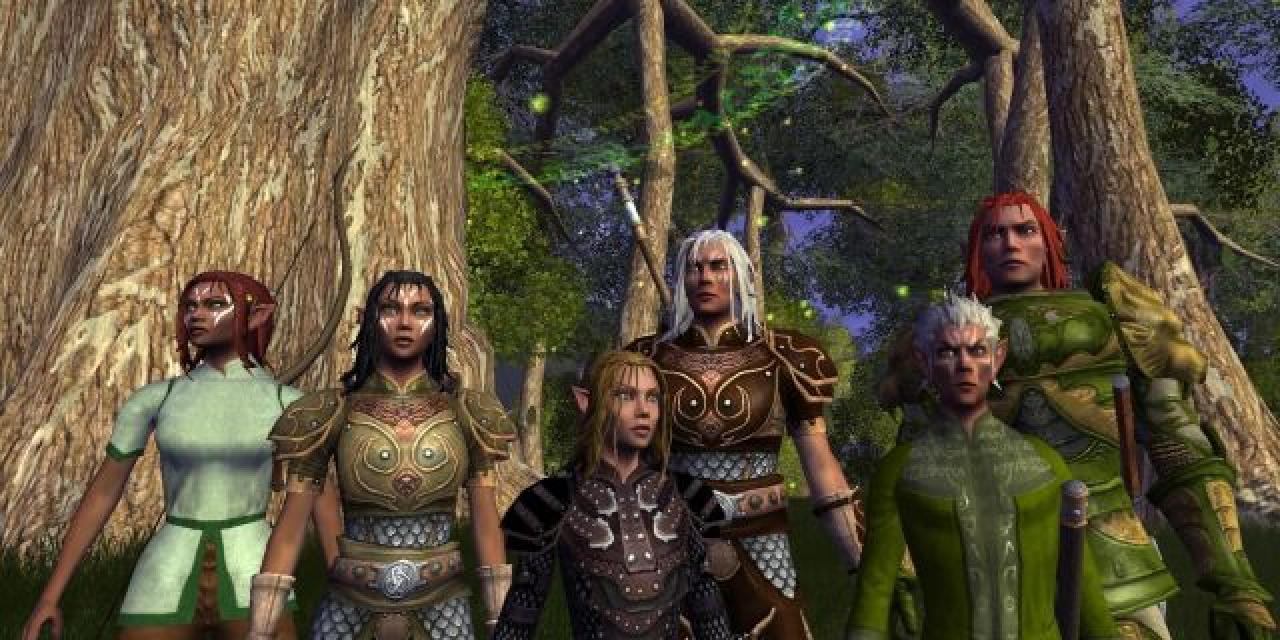




Sigil Games Online's flagship MMO, Vanguard: Saga of Heroes, is a tough game to review for three reasons. First, the reviewer was never very fond of EverQuest-and Vanguard is very much a follow-up to EQ. Second, the reviewer has seen a late Beta version of Vanguard, the retail release version of Vanguard, and most recently the newest patched version of Vanguard-making it feel as though there are three separate games to consider instead of just the one. Third, because World of Warcraft holds the MMORPG world by the proverbial nuts, Vanguard is and always will be held up to Blizzard standards whether or not that system of judgment seems fair. Regardless of these three reasons, it is the duty of any reviewer to put aside personal biases and give a game an honest chance to make a good impression. To do that however, we feel the need to look at Vanguard's protracted life story in an effort to show the hardcore and casual gamer just what this MMO has been through in its journey from development and onto your computer where it sits pretty consuming tons of memory.
It all begins with Brad McQuaid and Jeff Butler. Both were on the founding developer team of EverQuest and both left Sony Online Entertainment to found Sigil Games in order better bring about an MMO that's true to EQ's roots (unlike that cartoon acid trip; EverQuest II). Sigil Games began developing Vanguard: Saga of Heroes under Microsoft back in 2002. We're not sure what they were doing for those first two years, but it wasn't until 2004 that Sigil even announced what gaming engine they were using to support Vanguard. Two more years passed and, long story short, Sigil Games ran out of money and Microsoft gave them the boot. Sigil went back to Sony Online Entertainment in April of 2006 and the Vanguard hit the shelves in late January of 2007-whether it was ready to or not.
Saga of Heroes has been a long time coming, nobody can doubt that. But between gaming industry drama and the fact that the game was not ready to be released when it was, may have ultimately doomed Vanguard, no matter how many times it gets patched. Already, the casual gamer scorns Saga of Heroes; who wants to play a broken game? But for fans of EverQuest and a handful of hardcore gamers, Vanguard just might deliver a quality MMO gaming experience-you just have to focus on appreciating what Sigil was trying to make in order to justify the mess that they actually delivered.
When Saga of Heroes was released, the most common complaint was it doesn't look good on my computer. Everything from frame rate issues, to vanishing character models plagued Saga of Heroes right from the start. The best anyone at Sigil could say was that it looked fine on their test computers and that any problems were probably the result of the consumer's computer. The tech specs for Vanguard are a bit heavy for an MMO (20GB on the hard drive…where do we find such space?), but Jeff Butler insisted in an interview with Gamespy that anyone who could run The Elder Scrolls IV: Oblivion on their computer could reasonably run Vanguard: Saga of Heroes. That may be true now that the game has been patched several times over, but oh boy do we beg to differ when it comes to the retail release.
We also have to mention FaceGen; as the name implies, it's a piece of middleware from Singular Inversions that games can use during the character creation process. The Elder Scrolls IV: Oblivion uses FaceGen to great effect (though sometimes with pug fugly outcomes), but we can't say the same for Vanguard. A lot of the NPCs wind up looking the same because for whatever design flaw-based reason, FaceGen is spitting out faces that look a lot alike. And despite there being a multitude of races to play, there are only 4 to 6 different styles of hair, body, and clothing to choose from in each character model. Multiple body ratio bars provide a vague illusion of control over character appearance-but your eyes won't lie to you when all is said and done. This really counts against Vanguard's fictional world of Telon as the world is supposed to have three continents with distinct racial differences between all the races. Even the animal people classes look humanoid and have the same body models with colored fur slapped on. So while it would be a gross exaggeration to claim that all MMOs using FaceGen aren't up to scratch with character models (*cough* City of Heroes *cough*) we can say it shows a lack of imagination.
Graphics continue to be a major issue beyond the character models. While nothing so far is as bad as it was in Beta (random changes in character appearance, antialiasing not being supported for widescreen, etc.), it's still a bit unnerving to load into an area where all you see is some un-textured world geometry. This bug quickly corrects itself as the rest of the world draws in, but in the old days of the retail release, it was possible to spawn inside of the world geometry which led to all kinds of problems (and just looked plain sloppy). Aside from that, there is some slowdown when anything extremely pretty is happening on screen. Keith Parkinson's artwork apparently requires a lot of computer memory to do it any amount of justice. It is worth adding, at this point, that even if the character models are hideous, and sometimes your frame rate drops, the world of Telon looks gorgeous. Sweeping vistas, jagged mountain peaks, and wide open ocean all provide a colorful experience that would otherwise be very immersive to fantasy fans. Too bad the loading screens don't look as good.
The last thing we're going to talk about is the Unreal Engine 2.0. The Unreal Engine has powered many a game, providing a great FPS experience-but as Vanguard proudly demonstrates, the technology can be applied to MMORPGS as well. Back in 2004, Sigil announced that it would be using the gaming engine giant as a platform on which to build outstanding content without having to create a unique gaming engine. Of course they planned to modify Unreal Engine 2.0 to better suit the needs of Vanguard, but ostensibly, the inclusion of this engine was supposed to streamline development. Clearly, that didn't work out for Sigil as it was another 3 years before Saga of Heroes was released. And in that time, the Unreal Engine 3.0 came out and 4.0 is already being used in the development of many upcoming games. So, while Sigil may have missed the boat when it comes to having a revolutionary gaming experience by virtue of gaming engine, they've at least pioneered the way for other MMOs in the future.
The A.I. in the game is fairly standard. Buying a Sony Online Entertainment station pass will get you access to the game and may others for a decent discount. The U.I. is somewhat convoluted, but not all that different from WoW. Character creation screens are needlessly complicated and still a bit buggy despite the newly released patches. There were lots of other technical issues that marred Vanguard's release such as missing content, unbalanced character classes, disappearing quest items, and other such gameplay nightmares. But most of these issues have been addressed in patches, so we don't need to whine about them here. For a comprehensive list of everything that was wrong with Vanguard, we direct you to Google Vanguard anti-review and then you'll get an eyeful of everything awful.
Here's where Vanguard gets its chance to shine. We've talked a lot about Sigil wanting to be an innovator in MMOs instead of a WoW pretender-but we didn't believe it ourselves until we got out into the patched Vanguard and tried our hand at diplomacy, crafting, free for all PvP, and getting the snot kicked out of us so that we could experience MMO death in all new ways.
First, though, we need to tell you a bit about the life cycle of an MMO. Usually, developers make content and then build a world around that content-sometimes stretching the suspension of disbelief a bit far to make sense of certain races (orcs coming from a different dimension, bah!). In the case of Vanguard, Sigil went backwards-creating a vast world with nothing in it and then frantically trying to populate areas with quests, content, and most importantly a coherent lore that keeps the fantasy alive as you play. This tactic seems to be a bust: the game took too long to make, the world itself is filled with wide open empty spaces, and a lot of the content that made it into the game often doesn't go together with other content. The lore of the game seems to be relatively robust-but the quest writing is lousy and those with short attentions spans will quickly find that they don't give a damn. And, worst of all, different designers were tasked with making different starting areas with no over-arching standard of gameplay. So you've got one starting place that's entirely fetch-quests (kill two boars, kill six wolves, etc.) and another that involves invading a burning village. It might seem kind of cool to have so much variety-but ultimately it comes off as incoherent and sloppy.
All of that said, Diplomacy is by far the most interesting innovation that Saga of Heroes has to offer. It is more of a distraction than its own game, but the idea is you play cards with other characters to unlock key parts of the game's lore (and to manipulate NPCs to your advantage). The idea is that there are four types of diplomacy (inspiration, demand, etc.), and the cards that you play during a parley add or subtract points from each category both for you and for your opponent. The more points you have, the better, because you can spend them to play more powerful cards. The idea is to get the marker on the sidebar down to zero on your side of the bargaining table, in which case you win and the conversation goes your way. It's like one of those Yu-Gi-Oh! card games, actually-you play Common Ground, he plays his Blue Eyes White Dragon, and even if none of that has anything to do with diplomacy in real life (you wouldn't Enticingly Whisper to a foreign dignitary and then Forcefully Threaten them because that'd be sexual harassment), the marker moves and everybody's happy.
Where the ambition behind Vanguard is most evident is, arguably, in its vast game-world. It is by viewing the lush landscapes and beautiful visuals that the player can better understand the immense scope of the game. Powered by the Sigil Games motto; If you can see it, you can go there, the game-world is something to behold. Traversing the expanse is another matter however, and this is where Vanguard holds an obvious advantage over WoW; upon reaching Level 10 players gain access to mounts, your run-of-the-mill horse-like beast. On reaching level 40 though, players gain access to a range of flying mounts which, unlike WoW where you can only fly in the Outland Zones of The Burning Crusade, will take players anywhere.
There are also other things that Vanguard gets right. Crafting is more fun than in your average MMO because there are more things that you can do with it to benefit your character. Every character, from the lowest Bard to the highest Blood Mage can craft an item that will suit their unique skill sets. Because the world is vast and it takes forever to get anywhere, characters can get a mount at level 10. Characters start the game with a wide variety of weapons, spells, and armor instead of an empty inventory and a lot of beginner quests to do. And even though the character models are about as interesting as toenails, all the different classes definitely make each character feel unique to the player. The healing classes are more diverse and perfect for supportive players who sometimes wish that they could brawl with the best of the tanks (Clerics are notoriously hard to kill and they have a freaking mace).
And, of course, there's PvP. To be fair, Sigil wasn't going to include any sort of PvP until a few months before the end of the development cycle. Luckily, when they finally did get around to adding it in, there wasn't a lot to be done; Sigil doesn't over-regulate PvP outside of having separate severs for team PvP (which pits "evil" races against "good" races) and a free-for-all server where not even towns are safe from random attack. We could wax philosophical about the "right" way to do PvP here for an eternity (and we can sympathize with those who hate being corpse-camped), but the bottom line here is that by not over-policing PvP gameplay and by even bothering to include it in the retail release, Sigil has done something right for Vanguard rather than adding another layer of what's wrong.
We couldn't wrap up our look at Vanguard gameplay without adding this; dying SUCKS. It's not like WoW, where you get a spirit journey in totally invincible ghost form, and it's not as severe as permanent death. But when you go down in Vanguard, you feel it in a profound way: you start back at your bind point completely naked with no items. You can choose to summon your tombstone to you and reclaim some of your items, but it costs a ridiculous amount of XP and you don't get everything back in good condition. This might motivate you to run, naked and unarmed, out into the wild to find your tombstone in which case you don't lose as much XP and your items aren't completely trashed. Either way you choose to do it, very few people will classify dying as only a minor annoyance-it might even deter some people from trying PvP.
When a game takes as long as Vanguard did to develop, the risks increase; your technology falls behind that of the rivals and sometimes events in the industry leave you behind the times. Vanguard developers, through some flexible patching of UE 2, have managed to avoid most of the dangers of the technology race but the release of WoW has made the latter risk a reality for Sigil. The immensity of WoW's success has made finding a niche in the MMO world a daring mission and the ambition behind Vanguard means that it will, inevitably, be compared to Blizzard's beast.
Sigil may have bitten off more than they could chew when they set out to create a new MMO experience all those years ago under Microsoft. The sad truth is, most MMOs release broken. Stuff is missing, dungeons aren't accessible, and sometimes things are unbalanced. Even the Great and Eminent WoW has this problem. But Vanguard can't afford to be so imperfect when trying to achieve such lofty goals. Just because you can patch larger problems and release downloadable fixes for bugs months after release doesn't mean that you shouldn't finish a game before releasing it. An MMO lives and dies by its subscribers, and gamers-casual and hardcore-are unlikely to buy a game and then wait for it to get better.
Pros
+A decent follow-up to EverQuest
+More realistic than the cartoon antics of WoW
+Diplomacy makes things interesting even when it doesn't make sense
+PvP free-for-all lives up to its name
+Death actually has consequences
+It's nice to have so many classes and races to choose from
+Crafting isn't half-bad once you get the hang of it
Cons
-Not friendly to non-EQ fans
-Long learning curve (3 hours)
-Released broken
-Took forever to come out and too long to patch when it did
-Fragmented content and an empty world make it boring
-Ugly/plain character models
-Graphics bugs
-Heavy duty system requirements
Bottom Line: A bad first impression trashes any hope Vanguard can have of recovering subscribers it lost on day one. A real shame, because on day seventy-some-odd, things actually aren't so bad.








